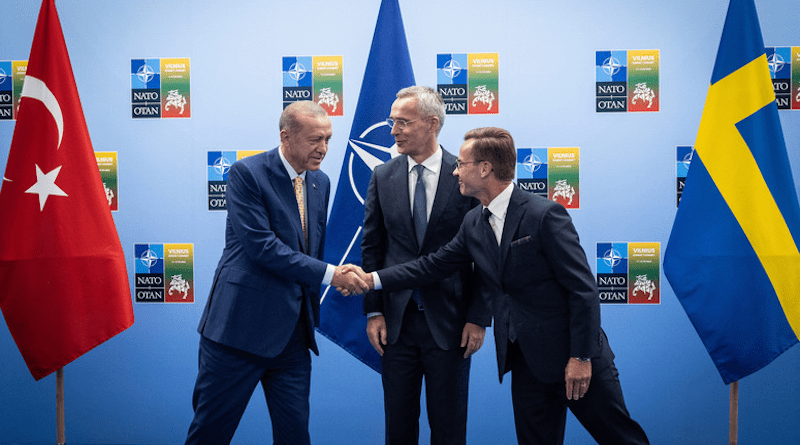Turkish-US Bargain On Sweden Remains Uncertain – OpEd
By Arab News
By Yasar Yakis
Two events dominated Turkiye’s agenda last week. One was the two successive attacks that caused the deaths of 12 Turkish soldiers. They were killed by PKK — the Kurdistan Workers’ Party — terrorists in northern Iraq. The second was the Turkish parliament’s Foreign Affairs Committee’s approval of a motion on Sweden’s admission to NATO. This motion will next have to be debated in a plenary meeting of the Turkish parliament, which is due in the second half of January.
Turkish public opinion received with indignation the news of the murder of the 12 soldiers. The parents of some of the victims could not withhold their anger upon the loss of their sons and loudly protested the government’s lack of capacity in coping with this event.
Several retired generals stated that Turkiye has strong cards in its hand but does not use them properly, suggesting that the PKK’s bases in Syria and Iraq have to be destroyed entirely. But this is more easily said than done.
Turkiye maintains good relations with Iraq, but the Iraqi authorities do not neglect their duty to record all border violations, as well as all the clashes that take place between the Turkish forces operating in Iraq and the PKK terrorists. A UN Security Council document says that, in the space of only three months between Aug. 1 and Oct. 31, Turkiye violated the border 1,453 times. In response, Turkiye says that because Iraq fails to deal with the terrorist activities in its territories, it feels compelled to take appropriate measures in line with Article 51 of the UN Charter.
Apparently, this altercation will not subside anytime soon. Wisdom requires that a thorough debate be opened, with the participation of all stakeholders, to arrive at a conclusion that is acceptable to the international community. At present, this debate is unfortunately conducted among the Turkish political parties, which accuse each other of being weak.
Beginning with the US, many NATO countries have now started to regard Turkiye as a liability rather than an asset. The US, Germany and France have a negative attitude toward Turkiye on several defense-related issues.
Prominent PKK leaders are being hunted down by Turkiye one by one. However, new leaders emerge and continue to cause headaches. The Turkish media regularly reports on the capture or elimination of PKK leaders of various levels, but the recruitment of new volunteers cannot be stopped.
Members of a movement called the “Saturday Mothers” gather every week. They are the mothers of the Kurdish families whose children joined the PKK. Both the government and the families use all their means to persuade these terrorists to return home. There are some who find a way to escape from the PKK, but the number of those who join the group is likely greater than the number who surrender to the Turkish authorities.
Without persuading the governments of countries that provide support to Kurds, such as the US, France and Germany, the elimination of the PKK threat will be difficult to achieve. The solution is probably to use diplomatic channels. Turkish-Swedish diplomatic channels, in particular, could be explored and developed.
The second important event that occupied last week’s agenda in Turkiye was the vote on Sweden’s accession to NATO in the Foreign Affairs Committee of the Turkish parliament. Now, the ball is in the court of the full parliament and the arm-twisting exercise between Sweden and Turkiye will begin — or, more precisely, between the Turkish parliament and the US Congress.
Stockholm has made important progress in restricting the activities of the PKK in Sweden. A constitutional amendment pertaining to the fight against terrorism was enacted in June. Joining the PKK terrorist organization has now become a punishable act in Sweden. Stockholm also appointed a public prosecutor to coordinate with the Turkish authorities. The Swedish mentality is different from that of the Turks; therefore, it may take time for the two sides to get acquainted with each other’s working methods. This will not be easy because the Kurdish community is very active in Sweden and it can influence the decisions of the Swedish government.
Although the subject matter is Sweden’s NATO membership, the concrete negotiations are taking place between the US Congress and the Turkish parliament. This subject was upgraded to the level of President Joe Biden and President Recep Tayyip Erdogan when the former reportedly told the latter: “You pass the law in the Turkish parliament (on Sweden’s NATO membership) and I will do the same by passing the motion in Congress (on Turkiye’s request to buy F-16 fighter jets).”
There is now a top-level commitment on both sides. However, it is unclear whether Biden will be able to persuade the majority of lawmakers in both chambers of Congress. In other words, Erdogan’s commitment is secure but we do not know whether Biden will be able to keep his promise. If some members of Congress insist on maintaining their anti-Turkiye attitude, the entire scenario will fall apart and Ankara will be left out in the cold. This would be a major disappointment for Turkiye.
During last week’s meeting of the Foreign Affairs Committee, the Turkish deputy foreign minister informed the committee that Sweden had lifted its embargo on defense equipment exports to Turkiye that was imposed in 2019. This shows that tangible progress has been made in Turkish-Swedish relations, but the distance still to be covered remains significant.
- Yasar Yakis is a former foreign minister of Turkiye and founding member of the ruling AK Party. X: @yakis_yasar

